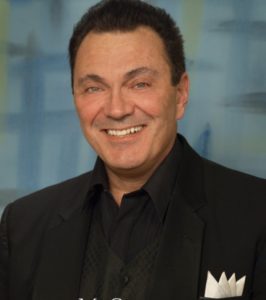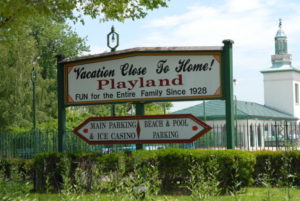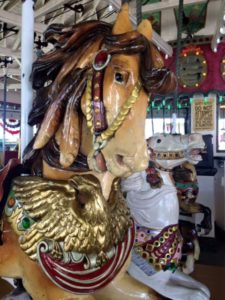While sitting on the Playland carousel, a 5-year-old boy watched his alcoholic father stagger off into the parking lot, get into his car and drive away.
That was a typical day at the amusement park during Larry McGowan’s childhood. Until he was 13, he went to Playland with his father during the summer from Wednesday to Sunday. They’d ride the carousel together two or three times until his father drowned the afternoon in beer.

“If I ever did a movie about my life, it’d be me on the carousel waving to my father, and my father listening to music until he went to the beer stand,” McGowan, now 64, said. said. “He’d have a few beers and disappear. I’d be on the carousel, and I would just stay there. He’d drink and ride some rides and get in the car and go home… He’d pass out on the couch, and my mother had to take a bus to get me.”
But McGowan wasn’t resentful of his father’s absence. He was content as long as the carousel continued its circular path, the horses bobbing up and down, and the organ playing its iconic tune.
And that’s how, McGowan said, he learned to play the piano; that’s how he developed his ear for music; and that’s how the carousel essentially became McGowan’s first music teacher.
“If you make a noise, I can say it’s this note or that note. It’s a gift,” he said. “And I think I developed it as a kid while sitting on the carousel going round and round and round for hours and just listening to the tunes. Then I’d go home and noodle it out on the piano before I even knew how to play.”
Although McGowan’s first keyboard was a hand-me-down from his sister—he didn’t have formal piano lessons until he was 9 years old—it didn’t take long for him to learn to play as well as a child prodigy.
His first performances were at Catholic Mass at Stations of the Cross and Benedictions of the Blessed Sacrament in his local White Plains parish. McGowan’s religious upbringing was strong; he went to Mass every Sunday and he was taught in a Catholic parochial school his whole life.
Thus, McGowan’s teenage years brought about a crossroads.
At age 13, he played the organ in front of the pope at the noon Mass during the 1964 World’s Fair in New York City. Not long after, his father bought him his first Wurlitzer piano. But at the same time, the Catholic faith tugged on his shirt sleeves, and he was forced to decide which career path to follow: music or the priesthood.
He joined the Carmelite Friars seminary, but his visit lasted only about six months.
“I used to play in the chapel when I thought no one was looking,” McGowan said. “I used to wear all these flashy things, and when [the priests] found me playing, they said, ‘This is not your calling. No, no. Showbiz is calling you.’”
Three years later, in 1967, he joined the Dunwoodie Seminary in Yonkers, but again stayed only six months.
“I thought [the priesthood] was going to be a way of life for me,” McGowan said. “ I decided it wasn’t for me if I was going to be an entertainer. There was no drinking. No womanizing. No cursing. All the things wrong with me that God is trying to fix.”
As much as he learned that the priesthood wasn’t for him, showbiz was.
And his musical career started in 1968 with Rat Race Choir, a progressive rock band that had a cult-like following on Long Island and the metropolitan area from the late ‘60s to the early ‘80s.
The group began as a bunch of teenagers in their White Plains homes. McGowan said he remembers practicing in his mother’s living room and performing in a number of Westchester venues and Long Island rock music clubs.
“It was a free-spirited time in my life,” McGowan said. “It was all geared around music and the band.”

But McGowan’s fast-paced world crashed and burned in 1979.
An internal strife with the band’s new management forced McGowan out of Rat Race Choir. The band was beginning to play in larger venues and clubs where sex and drugs were rampant.
McGowan didn’t like this new direction, and said he left Rat Race Choir with a bad taste in his mouth and most of his equipment either stolen or returned damaged.
After that, things only got worse.
On Halloween 1979, his mother was diagnosed with pancreatic cancer.
She was his only parent, literally and figuratively; he had lost his father shortly after the World’s Fair in 1964 to cirrhosis of the liver and lung cancer.
She died that Christmas Eve, sending the 28-year-old spiraling down a black hole.
“I took the Bible and threw it across the room,” McGowan said, “and pointed my finger at the sky and [cursed]. ‘You took my mother away while I’m supposed to be celebrating Jesus.’”
The death of his mother flung McGowan, now an orphan, into a five-year-long “bender.”
He played gigs all over, including legendary nightclubs like Danceteria and Studio 54 until four or five in the morning. He attended party after party, met a slew of musicians and crashed in strangers’ homes.
“I don’t know what else to call it. I just let go,” he said. “It wasn’t just drinking. It was drugs, it was drinking, it was eating, it was having sex with all these theater people… I walked the borderline of excess of all the vices.”
McGowan was speeding 100 mph straight into a brick wall, when a Bible seminar at Madison Square Garden in New York City may have saved his life.
McGowan said he went to the seminar because he felt a need to reconnect with his faith, but was disgusted by the hypocrisy of priests in the Catholic Church who were involved in sex scandals. During the seminar, he heard about Clinton Utterbach of the Redeeming Love Christian Center and joined his church two weeks later.
“He saved me,” McGowan said of Utterbach. “He opened up my head and poured in all the biblical truths that I needed.”
With the Redeeming Love Christian Center, a born-again Christian church in Nanuet, N.Y., McGowan, then in his early 30s, found a new home. He sang in the choir and played the organ and the piano.
Life slowed down and started to brighten, and his Playland career then took off.
An employee at the amusement park, McGowan was the caretaker for the carousel’s organ. That was his baby, as he called it. He knew everything about the organ, and year after year, he made repairs to keep it up and running. For 35 years, McGowan, made the 100-year-old carousel sing.

He made the rest of the park come alive by creating unique bright signs and hand-painted rides. He became Playland’s artist, and his job became that of a historic preservationist.
McGowan was given creative freedom to paint the rides and signs however he saw fit. Instead of painting the caterpillar ride the standard green, McGowan painted it blue with designs to make it pop. He used his artistic touch on the carousel too; all 66 horses on the ride were painted by hand, and no two were painted alike.
“And don’t you know, the ridership went way up,” McGowan said.
Tim Cronin, CSEA union leader, said the park was more to McGowan than just a job; it was a passion.
“The park is part of Larry, and Larry is part of the park,” Cronin said. “He loved it and it loved him back. He did everything in the park. He’d take apart all the rides and put them back together. He was the only one trusted to paint the [carousel] horses because he knew the historical way that they had to be painted.”
Playland was, once again, a major part of McGowan’s life, just as it had been when he was a child.
McGowan rejoined the Rat Race Choir in 2009 and took part in performances at Mamaroneck’s Emelin Theatre, among other venues in 2010. But it wasn’t all smiles from then on, as McGowan survived a detached retina, a car accident that caused deep vein thrombosis in his left leg, kidney stones, and a DWI arrest and rehab in 2010.
McGowan smirked as he recalled the judge who oversaw his DWI case.
“He looked at my record and said, ‘Mr. McGowan, you have a very colorful background.’”
From that point on, McGowan says he has been clean. He retired from his job at Playland in July this year, accepting a retirement package; and he is waiting to see if Standard Amusements, Playland’s new operator, will offer him a contract to stay and continue his work as a historical preservationist.
In the meantime, he’s doing some work with a Sony music production company, helping to cut and edit tracks.
McGowan still lives in the same area near Bryant Avenue in White Plains where he grew up and where his band first began. But there’s one thing now void in his life: Playland, and he is yet to find something to replace it.
“Driving by in the early morning when the park is quiet, and I think there’s no real cause or reason to be here anymore,” McGowan said of the place he used to call home. “It’s such a big chunk of my life and now I have to find something else to take its place.”








